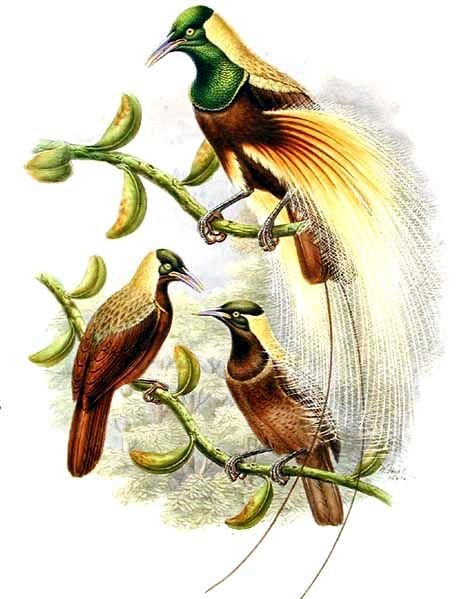Emperor Bird-of-paradise on:
[Wikipedia]
[Google]
[Amazon]
The emperor bird-of-paradise (''Paradisaea guilielmi''), also known as emperor of Germany's bird-of-paradise, is a species of
 The emperor bird-of-paradise is large, approximately 33 cm long, yellow and brown with a reddish-brown
The emperor bird-of-paradise is large, approximately 33 cm long, yellow and brown with a reddish-brown
BirdLife Species Factsheet
Paradisaea Birds of the Huon Peninsula Birds described in 1888 Huon Peninsula montane rain forests {{Paradisaeidae-stub
bird-of-paradise
The birds-of-paradise are members of the family Paradisaeidae of the order Passeriformes. The majority of species are found in eastern Indonesia, Papua New Guinea and eastern Australia. The family has 44 species in 17 genera. The members of thi ...
.
The emperor bird-of-paradise is endemic
Endemism is the state of a species being found in a single defined geographic location, such as an island, state, nation, country or other defined zone; organisms that are indigenous to a place are not endemic to it if they are also found els ...
to Papua New Guinea
Papua New Guinea (abbreviated PNG; , ; tpi, Papua Niugini; ho, Papua Niu Gini), officially the Independent State of Papua New Guinea ( tpi, Independen Stet bilong Papua Niugini; ho, Independen Stet bilong Papua Niu Gini), is a country i ...
. It is distributed in hill forests of the Huon Peninsula
Huon Peninsula is a large rugged peninsula on the island of New Guinea in Morobe Province, eastern Papua New Guinea. It is named after French explorer Jean-Michel Huon de Kermadec. The peninsula is dominated by the steep Saruwaged and Finiste ...
. The diet consists mainly of fruits, fig
The fig is the edible fruit of ''Ficus carica'', a species of small tree in the flowering plant family Moraceae. Native to the Mediterranean and western Asia, it has been cultivated since ancient times and is now widely grown throughout the world ...
s and arthropods
Arthropods (, (gen. ποδός)) are invertebrate animals with an exoskeleton, a segmented body, and paired jointed appendages. Arthropods form the phylum Arthropoda. They are distinguished by their jointed limbs and cuticle made of chitin, oft ...
.
The name commemorates the last German Emperor
The German Emperor (german: Deutscher Kaiser, ) was the official title of the head of state and hereditary ruler of the German Empire. A specifically chosen term, it was introduced with the 1 January 1871 constitution and lasted until the off ...
and King of Prussia
Prussia, , Old Prussian: ''Prūsa'' or ''Prūsija'' was a German state on the southeast coast of the Baltic Sea. It formed the German Empire under Prussian rule when it united the German states in 1871. It was ''de facto'' dissolved by an ...
, Wilhelm II of Germany
, house = Hohenzollern
, father = Frederick III, German Emperor
, mother = Victoria, Princess Royal
, religion = Lutheranism ( Prussian United)
, signature = Wilhelm II, German Emperor Signature-.svg
Wilhelm II (Friedrich Wilhelm Vikto ...
. In January 1888, the emperor bird-of-paradise was the last bird-of-paradise
The birds-of-paradise are members of the family Paradisaeidae of the order Passeriformes. The majority of species are found in eastern Indonesia, Papua New Guinea and eastern Australia. The family has 44 species in 17 genera. The members of thi ...
discovered by Carl Hunstein
Carl Hunstein (1843 – March 13, 1888) was a German ornithologist and plant collector.
Hunstein was born in Homberg, Germany. He emigrated to America, then relocated to New Zealand. From 1885 until his death, he was employed by the German New Gu ...
, who also found the blue bird-of-paradise on his journeys. These two species, along with the red bird-of-paradise, are the only ''Paradisaea
The genus ''Paradisaea'' consists of six species of birds-of-paradise (family Bird-of-paradise, Paradisaeidae). The genus is found on the island of New Guinea as well as the nearby islands groups of the Aru Islands, D'Entrecasteaux Islands and Ra ...
'' that perform inverted display.
Due to ongoing habitat loss, limited range and overhunting in some areas, the emperor bird-of-paradise is evaluated as Near Threatened on the IUCN Red List
The International Union for Conservation of Nature (IUCN) Red List of Threatened Species, also known as the IUCN Red List or Red Data Book, founded in 1964, is the world's most comprehensive inventory of the global conservation status of biol ...
of Threatened Species. It is listed on Appendix II of CITES
CITES (shorter name for the Convention on International Trade in Endangered Species of Wild Fauna and Flora, also known as the Washington Convention) is a multilateral treaty to protect endangered plants and animals from the threats of interna ...
.
Description
 The emperor bird-of-paradise is large, approximately 33 cm long, yellow and brown with a reddish-brown
The emperor bird-of-paradise is large, approximately 33 cm long, yellow and brown with a reddish-brown iris
Iris most often refers to:
*Iris (anatomy), part of the eye
*Iris (mythology), a Greek goddess
* ''Iris'' (plant), a genus of flowering plants
* Iris (color), an ambiguous color term
Iris or IRIS may also refer to:
Arts and media
Fictional ent ...
, bluish-grey bill
Bill(s) may refer to:
Common meanings
* Banknote, paper cash (especially in the United States)
* Bill (law), a proposed law put before a legislature
* Invoice, commercial document issued by a seller to a buyer
* Bill, a bird or animal's beak
Plac ...
and purplish-brown legs. The male has an extensive dark emerald green face and throat, two very long tail wires and large white ornamental flank plumes. The female is almost similar to the male, but has an all brown plumage, smaller in size and has no ornamental plumes.
References
External links
BirdLife Species Factsheet
Paradisaea Birds of the Huon Peninsula Birds described in 1888 Huon Peninsula montane rain forests {{Paradisaeidae-stub